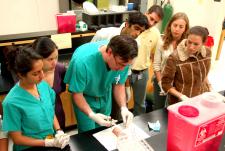Teaching medical students to challenge ‘unscientific’ racial categories
By Ike Swetlitz,
STAT
| 03. 10. 2016
Untitled Document
Medical students looking to score high on their board exams sometimes get a bit of uncomfortable advice: Embrace racial stereotypes.
“You see ‘African American,’ automatically just circle ‘sickle cell,’” said Nermine Abdelwahab, a first-year student at the University of Minnesota Medical School, recounting tips she’s heard from older classmates describing the “sad reality” of the tests.
Medical school curricula traditionally leave little room for nuanced discussions about the impact of race and racism on health, physicians and sociologists say. Instead, students learn to see race as a diagnostic shortcut, as lectures, textbooks, and scientific journal articles divide patients by racial categories, reinforcing the idea that race is biological. That mind-set can lead to misdiagnoses, such as treating sickle cell anemia as a largely “black” disease.
Read more...
Image via Wikimedia.
Related Articles
By Josie Ensor, The Times | 12.09.2025
A fertility start-up that promises to screen embryos to give would-be parents their “best baby” has come under fire for a “misuse of science”.
Nucleus Genomics describes its mission as “IVF for genetic optimisation”, offering advanced embryo testing that allows...
By Hannah Devlin, The Guardian | 12.06.2025
Couples undergoing IVF in the UK are exploiting an apparent legal loophole to rank their embryos based on genetic predictions of IQ, height and health, the Guardian has learned.
The controversial screening technique, which scores embryos based on their DNA...
By Frankie Fattorini, Pharmaceutical Technology | 12.02.2025
Próspera, a charter city on Roatán island in Honduras, hosts two biotechs working to combat ageing through gene therapy, as the organisation behind the city advertises its “flexible” regulatory jurisdiction to attract more developers.
In 2021, Minicircle set up a...
By Vardit Ravitsky, The Hastings Center | 12.04.2025
Embryo testing is advancing fast—but how far is too far? How and where do we draw the line between preventing disease and selecting for “desirable” traits? What are the ethical implications for parents, children, clinicians, and society at large? These...




